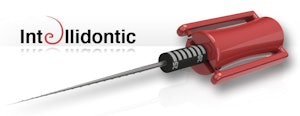
Inven is a young company in more ways than one. The founders -- Alex Frommeyer, Dan Dykes, and Alex Curry -- are all under the age of 25, and the company has only been in business for a year. But those numbers belie the experience and ability the young start-up's principals already display.
Their first product is the Intellidontic file, a patent-pending device designed to improve root canals by enabling practitioners to set and retain their ideal working length throughout the procedure, the company said. The file recently won Inven a $10,000 grant and free office space for a year in Louisville, KY, as part of a statewide business idea competition.
Staying on track for a fall 2011 release is the company's primary goal right now, Frommeyer told DrBicuspid.com.
"This could be our product to open us up into the world of dental innovation," he said.
Friends since freshman year, the three founders had already zeroed in on dental technology as their initial market when they first began talking about forming Inven. An offhand comment by Frommeyer's sister, a dental student at the time, sparked the idea for their first product.
"She said, almost as a joke, 'Hey, I have a problem -- maybe you can fix this,' " Frommeyer recalled. "In one course of hers, she and most of her classmates were finding it very frustrating to try and maintain the working length of their endodontic files; they constantly had to re-mark and re-measure the length as they worked on extracted teeth."
In the course of their research, which included interviews with practicing dentists, the Inven founders learned that the problem exists on the student level on up through trained, experienced professionals, he added. Working length is routinely lost and the practitioner has to leave the patient to re-measure and re-mark the file.
"There's a certain risk associated with this," Frommeyer explained. "A practitioner may overinstrument the tooth canal, causing damage or at least adding time to the procedure as he or she cleans up the mistake."
With an understanding of the instrument's shortcomings, they considered how it worked and found that it was relatively simple. "There was nothing out of reach for a business like ours," Frommeyer recalled. "So we said, 'This makes sense for our skill set, there's room for innovation, and it's a real problem that needs to be solved.' "
According to Inven's website, the Intellidontic file prevents perforation of the apex of the canal with a rigid marker. Another feature is an integrated measurement scale for measuring length of the file itself.
 |
| The patent-pending Intellidontic file is slated to hit the market before year's end. Image courtesy of Inven. |
Currently, the company is in the prototyping phase with the device. Practicing dentists are serving as technical consultants but are also providing feedback about market potential. Testing and market validation efforts will follow.
Phase I clinical trials should commence early in the summer, Frommeyer said. They plan to file a submission with the FDA afterward and hope to launch the product commercially before year's end. Inven is also in talks with several manufacturers, the names of which Frommeyer said he could not yet reveal, but there will be an announcement "soon," he promised.
Real-world experience
"Almost immediately" after meeting one another during their freshman year, the three University of Louisville J.B. Speed School of Engineering students discussed starting a business together, Frommeyer said.
"We did some consulting work in Louisville in industries like sustainable technology, dentistry, and manufacturing to get our hands dirty, to get some experience and really figure out what we wanted to do," he recalled.
They worked with various businesses -- start-ups, small and medium-sized companies, even inventors working out of their garages -- to gain insight into the design and prototyping of a new product.
“This product could open us up into the world of dental innovation.”
— Alex Frommeyer, CEO, Inven
All three had an interest in medical devices and have family members in dentistry, so there was a natural draw to the field. "The industry was growing, it was active, and it had a lot of innovation potential," Frommeyer explained. The conversation with his sister took place not long afterward.
With their project decided upon, the next step was to fund it, a tall order in late 2009. "A high-risk investment in a new business with recent college grads in a down economy" lacked appeal, Frommeyer admitted. They started applying for grants at the federal level in the hope that they would get enough to begin the research and development portions of their project.
"Then we wised up and looked at the state and local levels for financing opportunities," Frommeyer said. "The three states that share a border-- Ohio, Indiana, and Kentucky -- are doing a lot for the region to encourage new business ventures while luring existing businesses to move here."
They found a program administered by Kentucky that they qualified for that was aimed at new businesses in an emerging technology, applied for it, and won. Another funding victory came from a contest called Cincinnati Innovates.
Then in January 2011, they won Kentucky Highlands Investment's Business Innovation & Growth Center competition, which provided them with office space and a grant. Those successes have afforded the entrepreneurs the ability to fund research and development without an investor, with free public relations as an added bonus.
While they are confident that the Intellidontic file will be a success, Frommeyer and his colleagues want to avoid being a "one-and-done" outfit.
"We've already got a lot packed in behind what we're currently doing in endodontics," Frommeyer said. "While the prospect of commercializing our first product in the next six months is exciting, two years from now we'll have multiple projects in the works and, hopefully, a healthy young business going."
Copyright © 2011 DrBicuspid.com



















